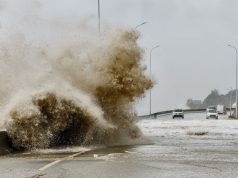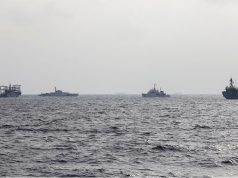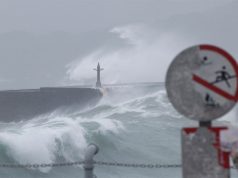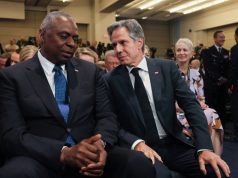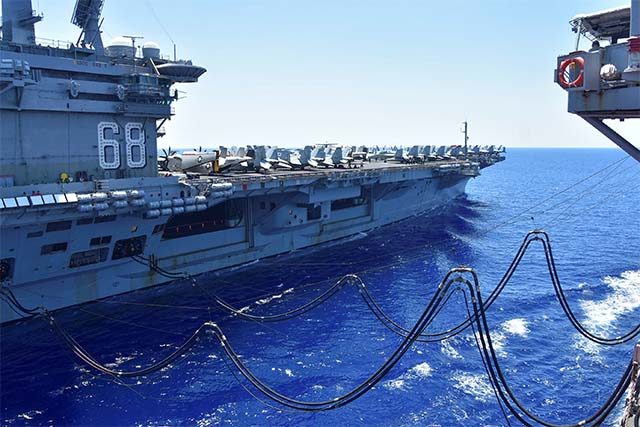
WASHINGTON/BEIJING — The United States on Monday rejected China’s claims to offshore resources in most of the South China Sea, drawing criticism from China which said the U.S. position raised tension in the region, highlighting an increasingly testy relationship.
China has offered no coherent legal basis for its ambitions in the South China Sea and for years has been using intimidation against other Southeast Asian coastal states, U.S. Secretary of State Mike Pompeo said in a statement.
“We are making clear: Beijing’s claims to offshore resources across most of the South China Sea are completely unlawful, as is its campaign of bullying to control them,” said Pompeo, a prominent China hawk within the Trump administration.
The United States has long opposed China’s expansive territorial claims on the South China Sea, sending warships regularly through the strategic waterway to demonstrate freedom of navigation there. Monday’s comments reflect a harsher tone.
“The world will not allow Beijing to treat the South China Sea as its maritime empire,” Pompeo said.
The U.S. statement supports a ruling four years ago under the UN Convention on the Law of the Sea (UNCLOS) that invalidated most of China’s claims to maritime rights in the South China Sea.
Chinese foreign ministry spokesman Zhao Lijian condemned the U.S. rejection of China’s claim.
“It intentionally stirs up controversy over maritime sovereignty claims, destroys regional peace and stability and is an irresponsible act,” he said at a regular briefing.
“The U.S. has repeatedly sent large fleets of sophisticated military planes and ships to the South China Sea … The U.S. is the troublemaker and destroyer of regional peace and stability.”
Chinese foreign minister Wang Yi, in a video call with his Filipino counterpart, condemned the United States for sowing discord between China and ASEAN countries, and urged the Philippines to “look forward, not backwards.”
The 2016 ruling that the U.S. statement referred to came about as a result of the Philippines challenging China’s claims in an arbitration court.
China claims 90% of the potentially energy-rich South China Sea, but Brunei, Malaysia, the Philippines, Taiwan and Vietnam also lay claim to parts of it.
About $3 trillion worth of trade passes through the waterway each year. China has built bases atop atolls in the region but says its intentions are peaceful.
More confident?
Analysts said it would be important to see if other nations adopted the U.S. stance and what, if anything, Washington might do to reinforce its position and prevent Beijing from creating “facts on the water” to buttress its claims.
“The Southeast Asian claimants, especially Vietnam, will feel more confident in asserting their jurisdictional rights under UNCLOS,” said Ian Storey, senior fellow at the ISEAS-Yusof Ishak Institute in Singapore.
The Philippines strongly supported a rules-based order in the South China Sea and urged China to comply with the four-year-old arbitration ruling, its defense minister, Delfin Lorenzana, said.
Taiwan welcomed the U.S. statement.
“Our country opposes any attempt by a claimant state to use intimidation, coercion, or force to resolve disputes,” Taiwan foreign ministry spokeswoman Joanne Ou told reporters.
The relationship between the United States and China has grown increasingly tense recently over various issues including China’s handling of the novel coronavirus and its tightened grip on Hong Kong.
China routinely outlines the scope of its claims in the South China Sea with reference to a so-called nine-dash line on its maps that encompasses about nine-tenths of the 3.5-million-square-kilometer waters.
“This is basically the first time we have called it illegitimate,” Chris Johnson, an analyst with the Center for Strategic and International Studies, said of Pompeo’s statement.
“It’s fine to put out a statement, but what you going to do about it?” —Reporting by Humeyra Pamuk, Arshad Mohammed, Matt Spetalnick, Daphne Psaledakis. Additional reporting by Yew Lun Tian in Beijing, Ben Blanchard in Taipei, and Karen Lema in Manila; Editing by Leslie Adler, Lincoln Feast, Robert Birsel, William Maclean




